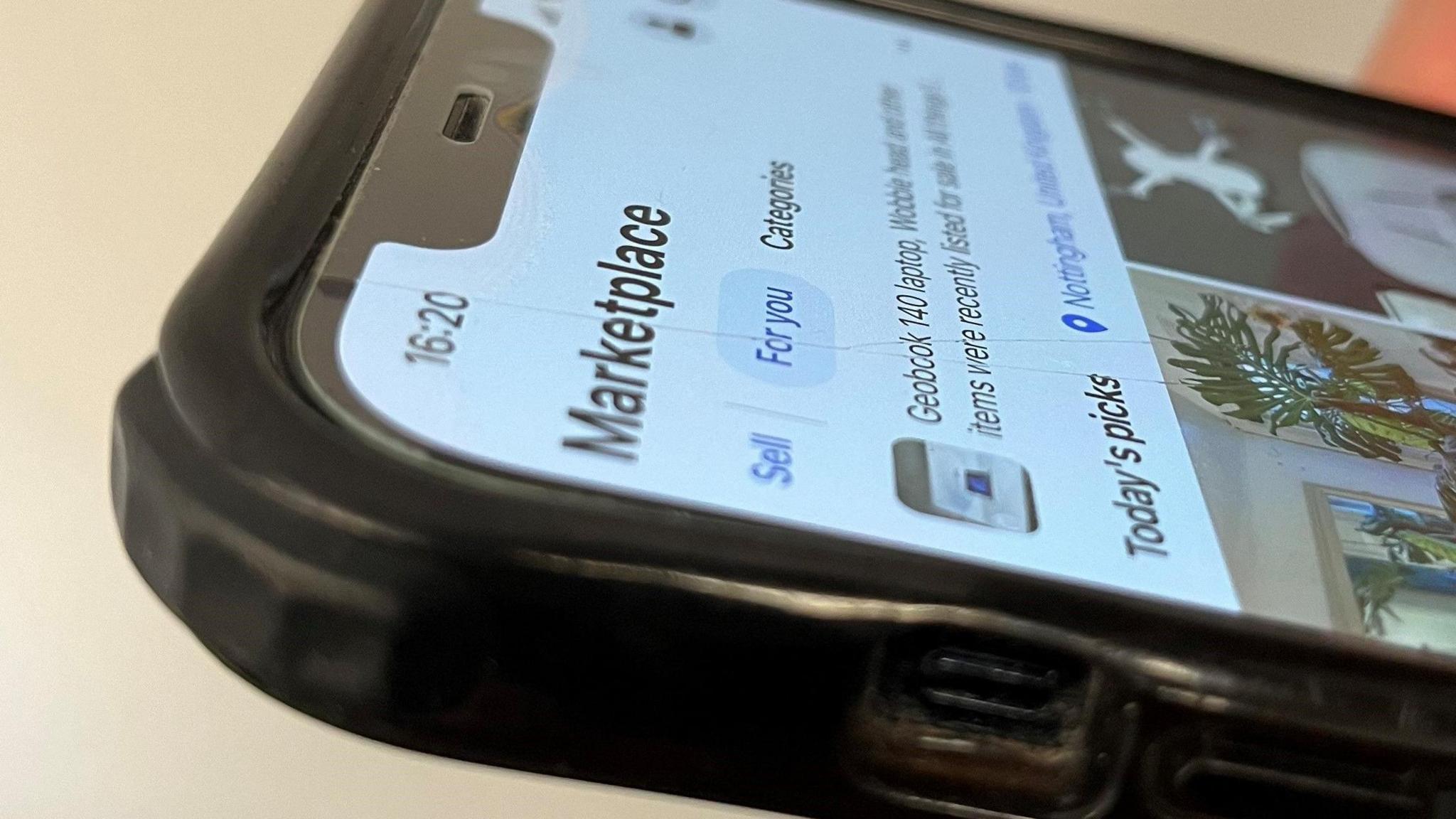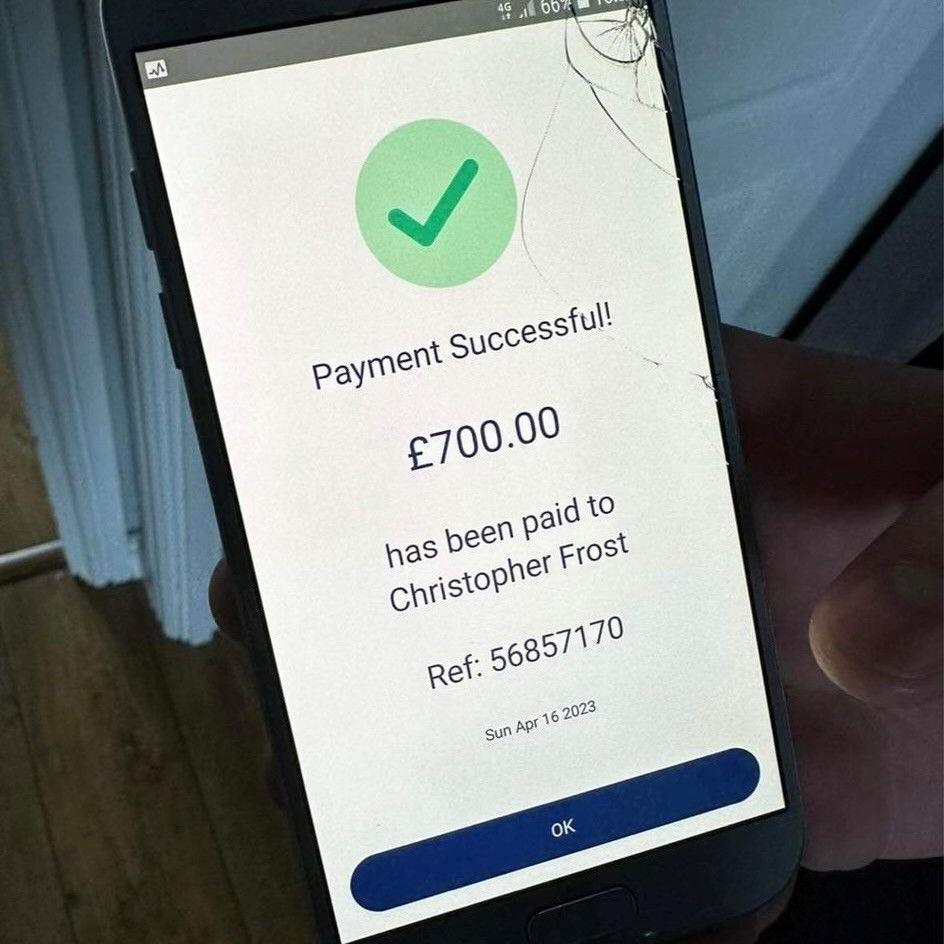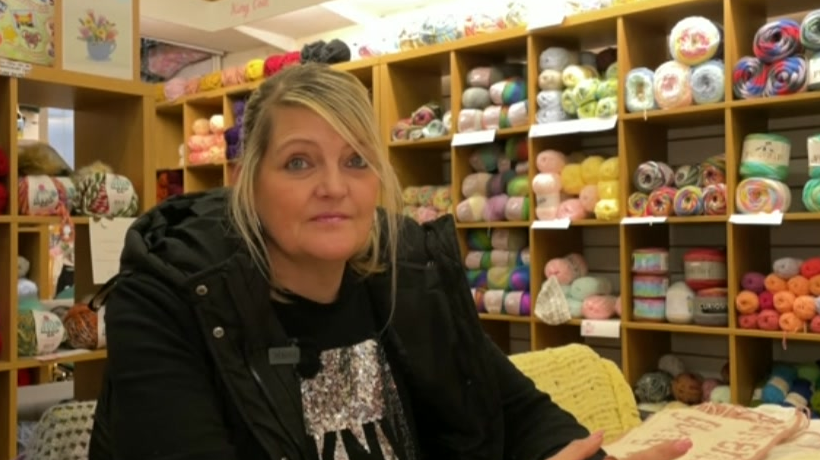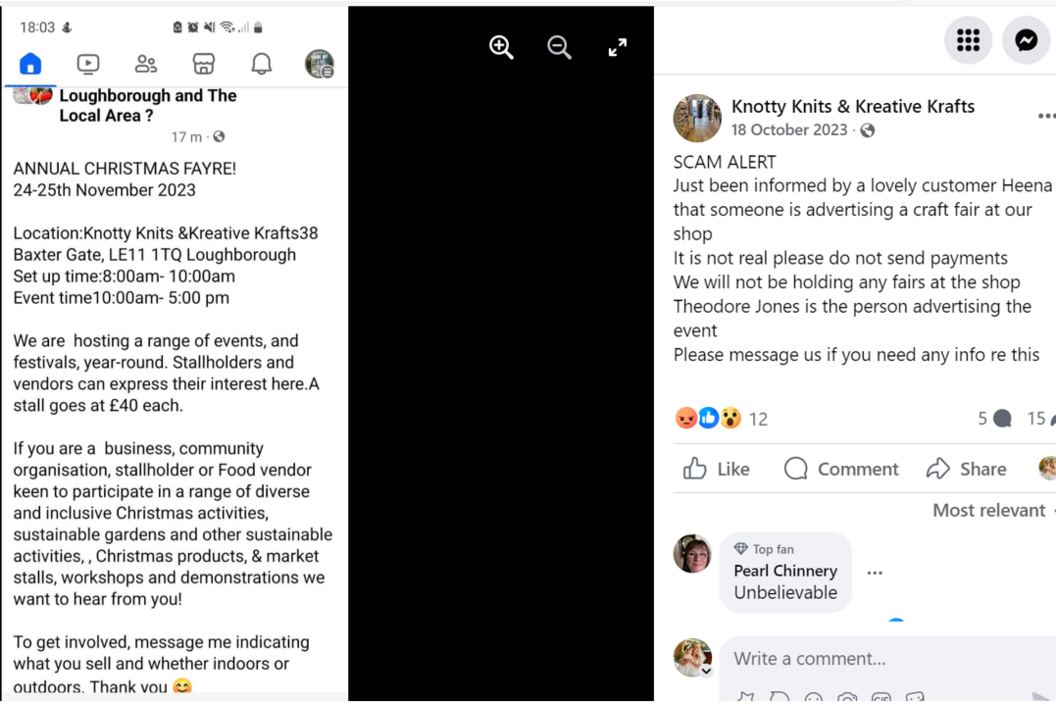'Facebook scammer tricked his way into our home'

Lucie Trew and Chris Frost with their daughter Elodie
- Published
Facebook has become a hugely popular way to advertise and sell products in the UK. But scammers are increasingly active on the platform, with some using brazen methods to deceive their victims.
Teachers Lucie Trew and partner Chris Frost were in the throes of new parenthood, an exciting, busy - and expensive - time of their lives.
Unsurprisingly, Chris's high-spec gaming laptop wasn't getting much use – so, hoping for a quick sale, they listed it on Facebook Marketplace.
A prospective buyer got in touch through the site. They checked out his online profile and found no reason not to trust him.
But all was not as it seemed.

Millions of people in the UK use Facebook Marketplace
Having a three-month-old and on statutory maternity pay, Facebook had seemed like the perfect place to make some quick cash for the young family, from Belper in Derbyshire.
They had uploaded pictures and a description of the laptop and exchanged six or seven messages with the prospective buyer.
According to Lucie, the man asked all the right questions and wanted to view before buying.
"We thought a genuine person would want to see it first," she said.
Lucie says there was nothing suspicious about his Facebook profile.
"His pictures were of his wife and kids. It had where he lived and his work," she said.
They welcomed him into their house and offered him a drink. He was warm and friendly, talking about being a dad himself and the difficulties of parenting.
He even met their three-month-old daughter.
Lucie said: "He seemed interested in us and in Elodie."
After showing him the laptop, they agreed on a price of £700.

The banking app shown to Lucie and Chris appeared genuine
The man then opened what looked like a banking app on his phone. Lucie says it looked real.
"It was a well-known bank," she said. "Chris saw the home page and a transfer click-through page."
Chris typed his bank details into the man's phone.
After 15 minutes the funds hadn't cleared. But they were reassured when he showed them some wording on the banking website about transfers taking up to two hours.
Elodie was hungry and Lucie didn't want to breastfeed with a stranger in the house, so they let him leave with the computer.
It had started to get dark and the money still hadn't appeared. The couple tried to call him but their number was blocked.
His Facebook profile had disappeared too. They realised they'd been scammed.
"We felt guilty. He'd been around our young baby, spoken to her. It was our responsibility to look after her.
"He knew our address. It made us feel unsafe in our own home with a new baby. We felt violated."

Lucie and Chris say the police and Facebook have done nothing to help
They reported the crime to their bank, the insurance company, the police and Facebook. But they say no-one investigated.
"They [the police] said we willingly gave away our property," says Lucie.
Lucie says Facebook wanted links to the man's profile but he'd blocked them so they couldn't see it any more.
"We had his phone number and our neighbours had CCTV of his car, but no-one was interested," she said. "I don't think anything will stop them [the scammers]."
A spokesperson for Derbyshire Police says the force told the couple to contact Action Fraud, and gave them "reassurance around any future risks".
Lucie and Chris aren't alone; they're one of a growing number of victims being targeted on Facebook.
The number of people complaining about being scammed on Marketplace more than quadrupled in the last four years. That's according to Action Fraud, external.
In 2019, there were 4,923 reports. That jumped to 20,735 last year.
Action Fraud says no-one is immune from falling victim, and have highlighted a number of tactics, external to look out for:
Criminals can pretend to be important people or a well-known organisation
Anyone who tries to rush you into a decision should not be trusted
Scammers will often use emotional levers to make you follow your heart, not your head
A fear of missing out on a good deal can be used against you
Is someone trying to gain your trust by showing particular interest in you, your family or your circumstances?
'I don't know how they sleep at night'

Emma Kilby runs Knotty Knits & Kreative Krafts in Loughborough
These tactics are all too familiar to Emma Kilby, who was also targeted by scammers who used her company name to front a fake craft fair.
"People trusted us as a business," says Emma, who along with husband Andy, runs Knotty Knits & Kreative Krafts in Loughborough, Leicestershire.
The couple are well-known to their loyal customer base.
One of their customers spotted an advert for the event, and because it hadn't been posted by Andy or Emma, it made her suspect it was fraudulent.

The fake craft fair advert posted on Facebook
The ad was asking for £40 per stall for an inside or outside space. That set alarm bells ringing for Emma.
"We don't have any outside space at the shop," she said.
"I clicked on the profile and they had no friends and you could tell the picture was fake."
Luckily, because they acted so quickly, no-one lost any money, but it has had long-lasting effects for Emma.
"It made us feel very vulnerable," she said. "It could have really damaged our business. I don't know how they sleep at night."

Nick Stapleton, co-presenter of Scam Interceptors
Nick Stapleton, co-presenter of the BBC's Scam Interceptors, says Facebook is "rife" with fraudsters.
But there is some simple advice to help avoid falling victim to these criminals.
"Behave online as you would do in real life," he said. "Assume that if you're dealing with someone you don't know, presume they are not trustworthy until proven otherwise.
"Facebook Marketplace is an add-on to an existing social media site. You need to treat it like the classified ads in the newspaper. You have no idea who's listed that advert."
Meta, the company that runs Facebook Marketplace, told the BBC: "We don't want anyone to fall victim to these criminals, which is why our platforms have systems to block scams.
"People can report this content in a few simple clicks and we work with the police to support their investigations.
"We have a trained team of reviewers who check these reports 24/7 and move quickly to remove content or accounts which violate our guidelines."
Follow BBC East Midlands on Facebook, external, on X, external, or on Instagram. Send your story ideas to eastmidlandsinvestigationsteam@bbc.co.uk, externalor via WhatsApp, external on 0808 100 2210.
Related topics
Related internet links
- Attribution